Why Every Kid Should Milk Cows
The same things that made me successful at milking cows made me successful in my career and in life.
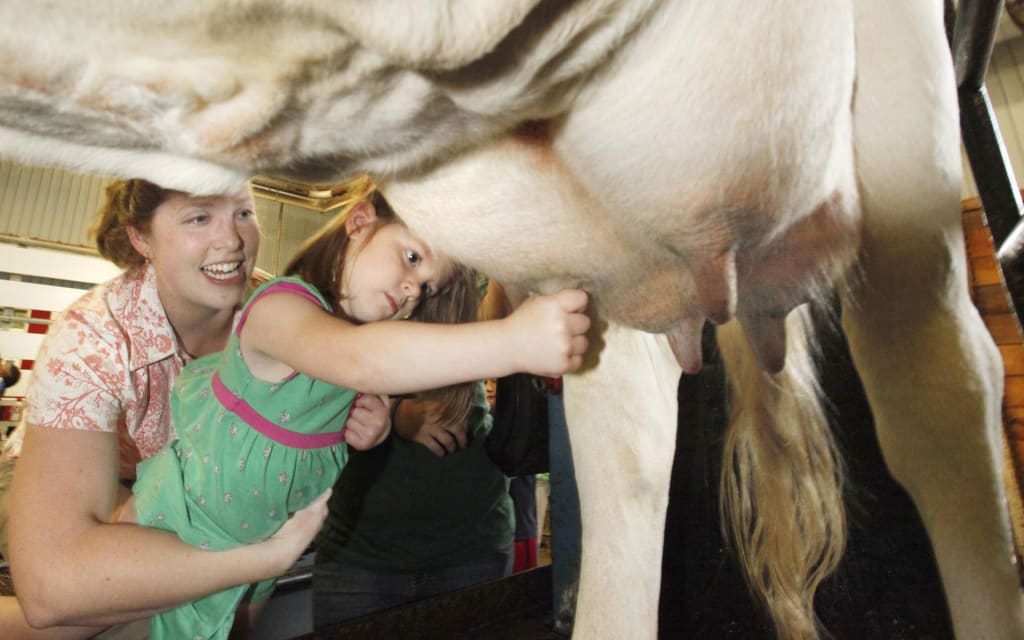
I grew up on a farm in Ohio in the 1940s. One of my major responsibilities was helping milk the cows. From the time I was six years old, the routine was established. Every morning I arose at 6 am, dressed, picked up two milk buckets, and headed for the barn. I did that whether it was snowing or a downpour. I milked those cows seven days a week, every week in a year. When I arrived home on the school bus in the afternoon, I rounded up the cows, took them to the cow barn, and milked them again.
My older brother had been milking cows five years longer than me. So I watched him, listened to what he said, and learned from him.
Life Lessons
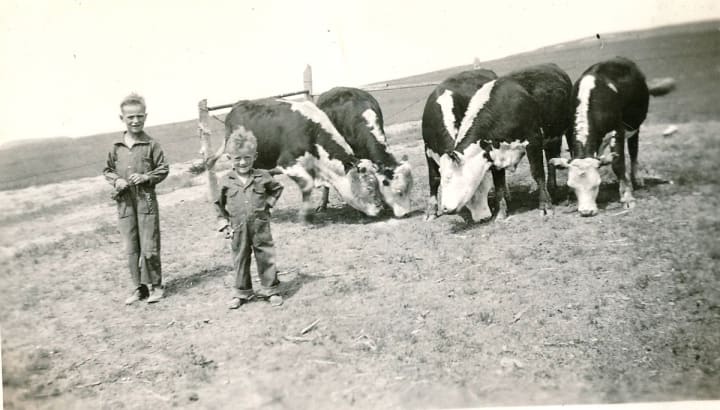
The first lesson I was taught about milking cows was this: you will get 75 percent of the milk in the first 10 minutes of the job and the final 25 percent in the last 10 minutes. The last 10 minutes will be much harder than the first 10. Because as the cow’s udder empties, it is harder to squeeze out the milk. But, you will keep working until that udder is empty. Because if you leave any milk, then the cow will only provide enough milk to refill the udder. The more often you leave milk in the udder, the less milk the cow will create. If you totally empty the udder every day, the cow will generate more milk.
I also learned that each cow is different and catering to those differences made the job easier for me and for the cow. Since the cows outweighed me by over 1,000 pounds, I had to earn their respect by always being there at the right time, emptying their udder, breaking ice off the water trough so they could drink, pitching down the hay from the haymow into their stalls, and spending the time after milking them in the afternoon to search out any horseflies that had attached to their skin.
Later my Dad sold the farm and we moved to the big city of Tampa, Florida. A huge change. But I carried with me the five critical lessons I had learned from milking the cows.
- If you have responsibility for something, you will do it every time without fail. No excuses. Learn the important aspects of the job and be good at it.
- Do not shortchange the job you do. You will always empty the udder, which means do 100 percent plus of the job, because that is what enables you to get better results.
- Understand those that you are working with so that both they and you benefit.
- Watch and learn from those around you.
- You have to earn the respect of others by always delivering what they are entitled to.
Carrying Lessons to the Big City
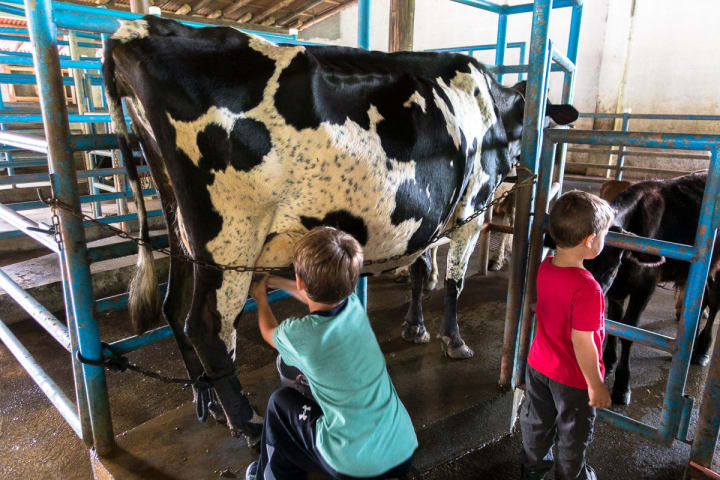
While in high school, I went to work at a supermarket as a bag boy on Saturdays. Back then, supermarkets closed at night and closed on Sundays.
One Saturday, the store manager said they needed someone to help out in the Produce Department. No one liked that job. I volunteered since it would be an opportunity to learn something new. The produce manager was so pleased with my work that he had me work in his department every Saturday. After a month, he asked if I wanted to work two evenings a week after finishing my school day. I was saving money for college and said yes.
By my high school senior year, I was working 23 hours a week and full time during the summer and vacation periods. Some days I would stay after the store closed to help the produce manager set up for the next day, take inventory, and figure out what additional produce needed to be ordered. The summer after high school graduation, the produce manager told the District Manager, who oversaw 10 stores, that I could handle the job when he, the produce manager, took his vacation. So I got to fill in for him and then several other vacationing produce managers. Each summer when I came home from college, the District Manager had me lined up for replacing produce managers throughout his district when they went on vacation. That enabled me to earn enough money to pay for most of my college.
The same things that made me successful at milking cows also made me successful on other jobs.
I graduated from college with a degree in Chemical Engineering and had a very successful career in industry. I had a wonderful 53 years of marriage until my wife passed away. The same principles that apply to milking cows also apply to creating a successful marriage. Our three sons all have very successful careers and marriages. They worked during high school and college and learned the principles that make a person a successful cow milker.
Milking Cows and Politics
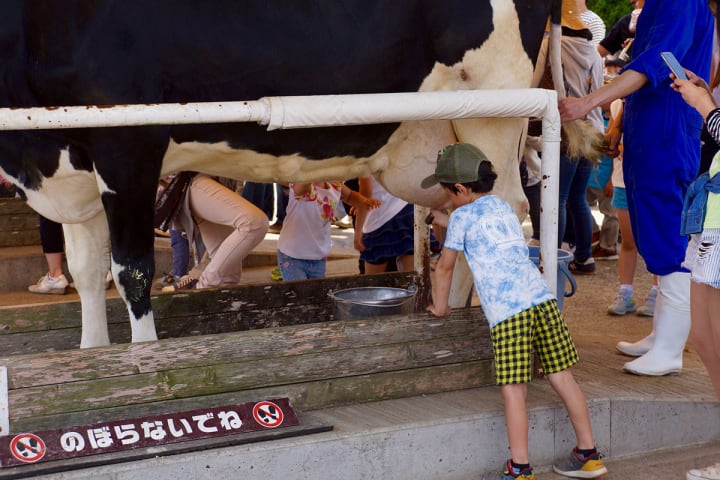
The principles of milking cows even applied to politics. In the early 1990s, Dow Chemical made me Vice President of their Texas Operations, the largest chemical complex in North America. At almost the same time, Ann Richards, an ultra liberal Democrat and dedicated environmentalist, was elected governor. Many business leaders told me that would be a disaster for the Texas economy.
When I had an opportunity to speak with Ann Richards, I took the cow milking approach. I told her “Texas can have both environmental excellence and strong economic growth. The biggest deterrent to achieving that goal is that business people, environmental leaders, and government agencies spend most of their time fighting with each other to get everything done their way. You need to establish a task force of those three groups and tell them that they are going to sit together and develop the program for achieving both environmental excellence and strong economic growth. Do not come back and say that they had the perfect solution but the others refused to listen. Do not come back with impressive sounding rhetoric saying that at sometime in the near future they will create miraculous programs that will do this. They are to provide action plans that they all support and will be rapidly implemented.”
In two minutes, I had told Governor Richards how she could do what no other politician in any state, and certainly not the federal government, had accomplished, what the deterrent was, and how to overcome that roadblock. Amazingly, one week later, Ann Richards called me up, said she was going to establish the task force, and wanted me to be one of the leaders. In less than a year of sometimes tumultuous meetings and an amazing amount of learning from each other, we introduced programs that simplified environmental regulations, expedited implementation of environmental programs, and replaced litigation with cooperation. The state of Texas dramatically benefitted because a Conservative Republican chemical executive and a fiery Democratic Party political leader worked together for the benefit of everyone rather than exclusively themselves. We sometimes disagreed but always listened to each other and utilized the unique skills that each of us had to create benefit for everyone rather than just ourselves.
Governor Richards added me to another task force working to protect important wildlife areas. One location was going to require litigation and a heavy purchase cost for the land. So I talked to one of my General Managers who had lived in Texas all his life and he and his Dad were avid fishermen and hunters. Two days later, he came back with a very creative solution that eliminated all the litigation and we only had to purchase 10 percent of the land. Milking cows teaches you that when you face a difficult, complex problem, find someone who knows more about it than you do. The task force was absolutely thrilled and I had myself replaced on the team by my General Manager because he knew much more about this subject than I did.
Always Finish the Job
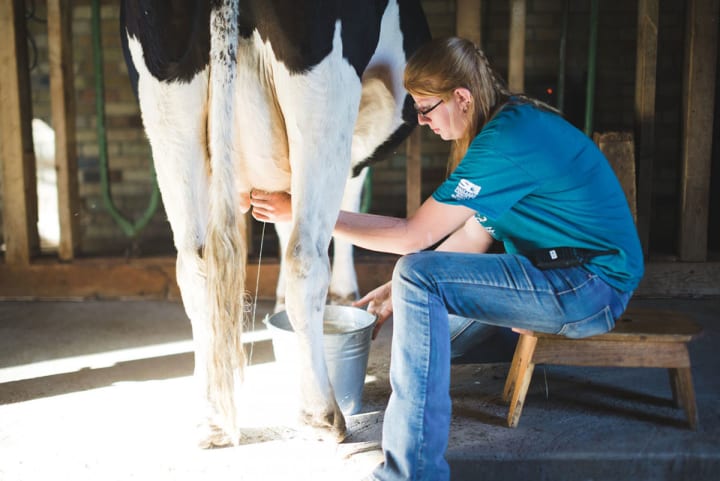
Ironically, when I toured Russia in 2014, I noticed while traveling by train from Petersburg to Moscow that, even though this was a section of country like our Midwest, there were absolutely no farms, barns, not even cow pastures. I mentioned this to the Russian woman who was touring our group through Moscow. She said that when the Communists took over, they confiscated every farm and animal, then destroyed the homes and barns. Everyone was housed in concrete apartment buildings and put to work in the giant farm commune run by a political commissar.
One of the assignments for her great grandfather was to milk cows, which he was very knowledgeable in. But he was severely reprimanded for only milking nine cows in the time frame rather than the 12 assigned. He said that was because he was emptying the cow’s udder, while others were leaving some of the milk in the udder. He was ordered to do his 12 cows. Over a period of time, milk production dropped to half of what it should have been and the total mismanagement of the grain fields resulted in the commune eventually being abandoned. When Communism collapsed in the 1990s, the land was offered free to anyone who wanted to farm it. But today, very few in Russia know how to farm or the value of emptying the cow’s udder. The tour guide was absolutely thrilled that I knew and so could relate to her story. In a unique way, the failure to empty a cow’s udder contributed to the collapse of Russian Communism.
I’ve wondered if we should remove children from homeless shelters and take them out to a dairy farm. Take some cows off the automatic milking machines so that the children will learn the responsibility and importance of correctly milking cows. That will prepare them much better for life than having them sitting around in a city homeless center.
Maybe we should also require all students to take a hands-on laboratory course on how to milk a cow and the necessity of always doing the job regardless.
Even better, make every member of Congress, the President, and the President’s staff spend three months milking cows at a dairy farm.
That may be the best way to make America great again.
About the Creator
Robert Gallant
Had a successful 40 year career in technology. The 81 year old now writes fiction novels and focuses on exercising to stay healthy and young in spirit.






Comments
There are no comments for this story
Be the first to respond and start the conversation.